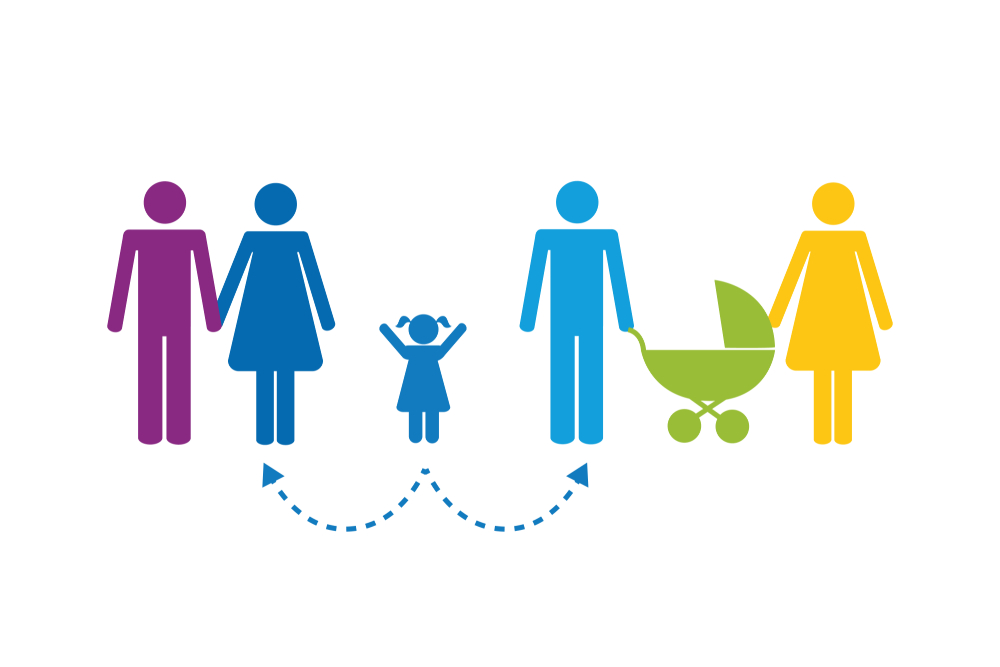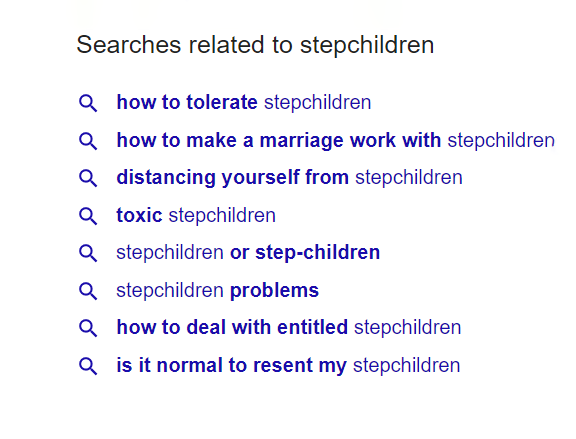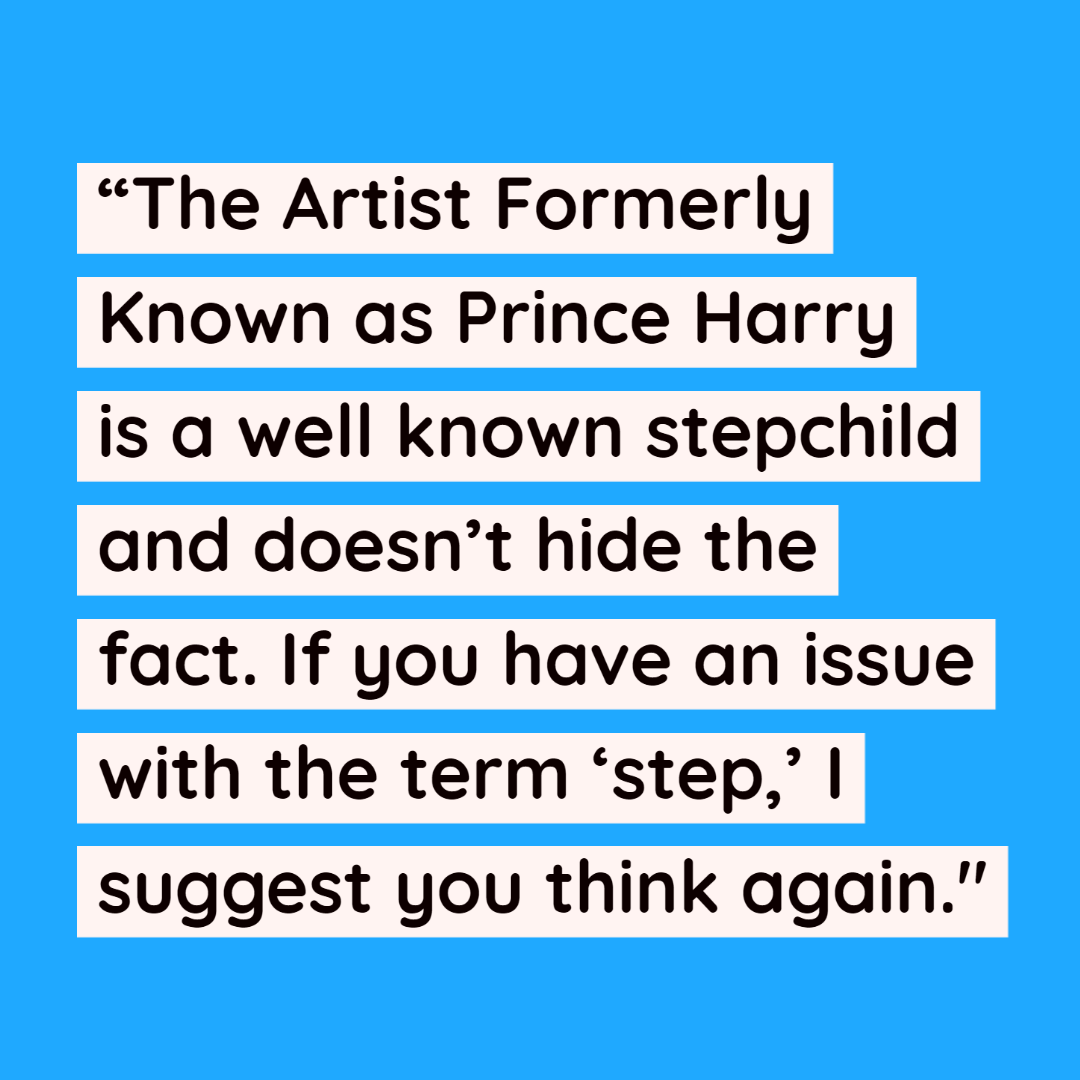A little while ago I received a phone call from a journalist. In a cheery voice, she explained she was doing some research for a news story about stepfamilies. A survey was about to be published showing the majority of respondents thought the phrase “step” was outdated when referring to step relatives and stepfamilies. She asked what I thought of this. When I explained I was “appalled” at the suggestion she was genuinely shocked and the cheery voice melted away to be replaced by a more formal tone.

I went on to explain that to a stepchild such as myself, this was a matter of identity. Some people would have excellent relationships with their stepparents and be quite happy not to use the term “step.” For a variety of complicated reasons, many would not feel comfortable banishing it from the language. Regardless of how anyone felt, I was strongly of the opinion that’s it’s simply unacceptable to be telling stepchildren or stepparents how to describe themselves or make them feel bad for using the word “step.”
It never ceases to amaze me how little understanding there is of stepfamilies and step relatives. The conversation I mention above is just one example of how misunderstood stepfamilies can be. This is surprising as 42% of marriages end in divorce so there must be a lot of us steplings out there (yes, I did just make up the phrase stepling, although maybe blendie is equally appropriate?).
The other issue I have noticed is that public discussion of stepfamilies is almost entirely driven by stepparents. Us stepchildren are a quiet bunch, sometimes bruised by the experiences life has thrown at us. Many of us have experienced loss and significant disruption to family life at a young age and we’re not always encouraged to speak about this. It’s rare for someone to speak up about life as a stepling and when it happens, the focus is almost entirely on young stepchildren or settling children into a newly blended family.
Not only are us stepchildren widely ignored, but we seem to have a bit of an image problem. I appreciate this is very unscientific, but take a look at the graphic below. This is what Google suggested when I did a search for “famous stepchildren.” How does that list make you feel?

Insensitive Comments: The Greatest Hits
Having been mulling it over for a while, I’ve put together four of the most common and insensitive comments that I’ve heard over the years. I’ve also provided an explanation as to why these phrases bother me so much and are best avoided. I must make clear these are all comments that have been made by people from outside of my family unit. These are not phrases that stepparents should avoid, you’ll find plenty of those lists elsewhere on the internet.
Before I launch into this, a word of caution. To state the obvious, every single family, be they step, blended or otherwise, is different and every individual is unique. Some stepchildren and stepparents don’t like using the phrase step or blended. Others will insist upon it. My advice is to proceed with caution and to be sensitive.
You can’t be a stepchild, you’re over 18
Okay, I’ve paraphrased something that was said to me during an incredibly complex conversation. Nonetheless, this has to be one of the daftest suggestions I have ever heard.
Being a stepchild (or a stepmum or stepdad) is a major commitment. The relationship doesn’t end simply because a youngster hits the age of 18.
In fact, there are certain milestones you reach as an adult where your status as a stepchild becomes highly relevant and can become emotionally charged. Should a stepchild choose to get married, careful consideration often has to be given to invites, speeches and seating plans. The arrival of a child can also be a pinch point.
Natural children don’t stop being children when they become adults. The same applies to stepchildren.
Call them your family, not your stepfamily
Let’s tackle the results of the survey my journalist friend was talking about. If ever there was a way to demonstrate a complete lack of awareness of the stepfamily dynamic, it’s to suggest someone should not use the phrase “step.” A majority of the survey respondents may have said they felt it was outdated and I have no doubt they answered this with the best of intentions, but to suggest such a thing is dreadfully misguided.
It is a very personal matter. It’s up to the individual and the circumstances the individual finds themselves in as to whether they identify as a stepchild or stepparent. It may have little consequence at the dining table on Christmas day, but it can, quite rightly, have huge significance on the hospital ward, the school or in the courtroom and other official channels.
The key point, however, is that by saying the word should not be used, you make it dirty. It’s a statement of fact that I am a stepchild. I have been one since I was a very young boy and I shouldn’t be put under any pressure to deny it.
There are times when it is useful, necessary even, to identify as a stepchild. If there has been a remarriage, stepchildren are likely to have a different surname to the other members of their family unit. That’s very difficult to explain without telling people your exact status within a family.
Prince William, The Artist Formerly Known as Prince Harry and Barack Obama are well known stepchildren who don’t hide the fact. If you have an issue with use of the term ‘step’ and you think it is an outdated term, I suggest you think again.

Don’t call them your stepmum/dad, call them your mum/dad
This follows on nicely from the above example. It is just that bit more specific.
This has come up in conversation a few different ways but here’s the bluntest and rudest way it was raised with me. When I was about 15, a complete stranger told me I should refer to my stepfather as my father. He went on to explain that referring to my stepfather as a stepfather suggested there were problems in the family.
As I say, this weird and ridiculous incident happened many years ago. It was a very odd thing for this man to say and to this day I find myself wondering what the guy’s problem was. His words caused me great offence because he was tramping all over highly personal territory. You simply don’t tell anyone how to refer to family members.
I shall also demonstrate my point with a hypothetical scenario. Let’s say a divorced man in his sixties with three adult children marries a 25-year-old Ecuadorean lingerie model. Would you really expect the children from his first marriage to call their dad’s new wife “mum.” Would you really question his children if they chose to refer to their dad and new wife as their “stepfamily”?
Yes, okay, that example was totally facetious. Nonetheless, divorce and remarriage can happen in circumstances that strain family relations.
I can think of real examples where divorced parents with adult children have made the most bizarre marriage choices later in life. I’m talking about the kind of scenarios where people marry partners younger than their own children or marry following whirlwind romances that go awry or where the marriage means an inheritance promised to natural children gets diverted to stepfamily members.
Telling people how to refer to their step relatives is a minefield. It’s best avoided.
But she is still your mum / still your dad
Commenting on a stepchild’s natural parents can be as fraught as commenting on their step relatives. If you don’t know the family history in detail, leave well alone.
I’ll give you a further hypothetical scenario (although it’s one that’s not unheard of). Let’s assume a woman deserts her family to live with another man (…or woman). She chooses to cut all ties with her children or maybe she turns up in their life every three or four years with an armful of expensive gifts before disappearing off again a day or two later.
In these circumstances, the stepparent has probably got a considerably more positive and productive relationship with the child. Regardless of their age, the child will probably be very conflicted and won’t need reminding their natural, aloof parent is “still their mum.” They may simply wish to have a more distanced relationship with them.
I’ve heard this phrase used a few times. It’s telling that I’ve only ever heard it used by people who have no experience of stepfamily life.
I can’t, however, mention this example without highlighting the plight of children who are victims of parental alienation. That’s a despicable thing for any child or parent to experience and such circumstances need handling with incredible care.
Getting it right is not that difficult
Stepchildren don’t need telling how to refer to their relatives or their families. It’s between them and their closest relatives and step relatives.
It’s deeply personal. All that’s needed is a little sensitivity and understanding. I think most people are okay with the former, but many fail when it comes to understanding the complex world stepchildren often live in. I think people forget that stepchildren grow up and those complexities carry on into adulthood.
If someone wants to refer to themselves as a stepchild or stepmum, stepdad or refer to their family as a step or blended family it’s up to them. No one else should be telling them what language to use.
Oh, one final word. That survey? The results were never published in the end. I think someone saw the error in their ways and realised they were about to make a massive mistake.







7 thoughts on “The much misunderstood world of the stepchild”
I couldn’t agree more. I am a father in a blended family, bringing two sons into the relationship and my partner bringing her two daughters.
What to call each other is a deeply personal topic and based on so many different, subtle and complex factors. How much time each child spends with you dictates how fast relationships grow and nurture. My step-daughters (called that for clarity – I see them as my daughters) are here 24/7. My sons spend roughly 2-3 nights a week here.
We had a conversation with them all before we moved in together. We are free to call each other what we wish, with the agreement of the other person, and there is no need for hurt feelings if that is not reciprocated.
In a vastly complex scenario, it has been refreshingly simple. 5 years in and we have not had an issue. “Hey Bro, good to see you” is a common shout from upstairs upon arrival.
It’s often the adults, overthinking and projecting emotions that cause the issue to become complex. My 4 kids seem to take it in their stride.
It is indeed other adults overthinking and projecting that causes the issue. I may be wrong, but I think people from outside of the family unit (stepfamily unit) can project very unhelpful emotions.
I once heard that when a couple breaks up, people in their friendship circle withdraw and start assessing their own relationships for signs of cracks. The couple breaking up can be abandoned by some friends, at least temporarily, because the friends fear their own relationships may be tainted by their friends’ break up.
I think it can be similar with stepchildren. Adults from outside the family unit just want to brush the “step” element under the carpet because it is a reminder that somewhere along the line, there has been a relationship break up or bereavement. Stepchildren can also be put under pressure by well meaning adults to simply accept their new family unit. It is bound to be unsettling to them and time will be needed to adjust. It’s this lack of understanding that creates resentment and the sad fact is step kids can carry this in to adulthood.
Anyway, best of luck with your parenting and stepparenting journey.
Being a step father myself and having 2 amazing step daughters I’m shocked at some of those search results. I would never disregard them as my step children when they turn 18.
It is difficult. I see being a step father as a privelage and a gift. Having 2 amazing children and helping them to grow and learn. They don’t call me dad but by my first name. They are equal to my own children and are not treated any differently.
Such a great post John.
Thanks Eddie. I hope it came across that my post was not pointing the finger at stepparents but at those form outside the family unit. Stepparents themselves are likely to be more sensitive.
As I said on Dadvengers last night, stepkids are a real, living reminder of some kind of relationship trauma. be it a break up or bereavement. Alas, many adults find such subjects difficult to process or face and so don’t like to recognise someone may be a stepchild, hence why it gets brushed under the carpet. That’s the individual’s problem and they need to get over it.
Late reply, I really should check the notify of reply box ????
Not at all I know your meaning. I recently wrote a post around being a step father as you know ( thanks for the comment by the way). I’ve been judged by family members especially my dad for my choice of entering a relationship with my fiance sarah who has 2 children ( my step daughters), and questioned from others negatively with the likes of oh your the step dad, so why are you so hands on with your step daughters.
It is comments like those that P me off with regards to being a step parent.
As you will know there are various angles to cover the subject of step parents and everyone will have varying opinions and experiences.
i agree with “The key point, however, is that by saying the word should not be used, you make it dirty. It’s a statement of fact that I am a stepchild. I have been one since I was a very young boy and I shouldn’t be put under any pressure to deny it.” nice article. Thank you for posting information like this
An excellent article I agree whole heartedly with every point you made. I would also like to drag into the conversation the other component of many blended families the half sister/brother. Without the use of step how do you begin to explain the complicated relationships within a blended family. Certainly what everyone calls each other on a daily basis is up to the individuals but when dealing with outsiders then you need the more formal definition.